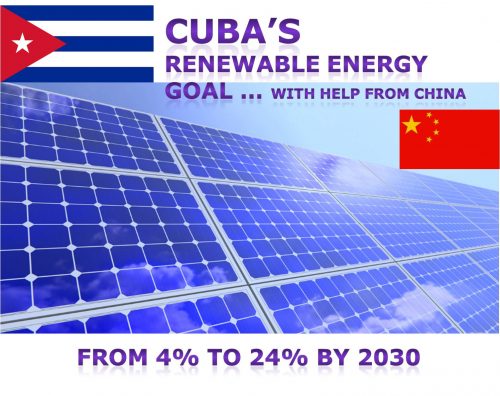At the weekend, China and Cuba signed nearly 30 agreements to boost economic ties between the two countries, including a range of deals on green energy.
The deals were signed as Chinese prime minister Li Keqiang met with Cuban president Raul Castro during Li’s short trip to the communist Caribbean island nation.
While Li is the first Chinese premier to visit Cuba in over 50 years, the event is part of ongoing high-level negotiations between the two countries that have been going on for some time.
 With help from China in manufacture of solar panels and finance for other renewable projects, Cuba intends to increase its proportion of energy from renewables from today’s 4 percent to 24 percent by 2030.
With help from China in manufacture of solar panels and finance for other renewable projects, Cuba intends to increase its proportion of energy from renewables from today’s 4 percent to 24 percent by 2030.
According to Cuban state-run media, the purpose of the meeting was to boost economic cooperation in a range of sectors, including: renewable energy, agricultural equipment, construction, public transport, telecommunications, biotechnology, and pharmaceuticals.
The agreements also included memorandums of understanding for technology transfer and collaboration on research and development in biotechnology.
Despite the economic constraints of over 50 years of United States embargo, Cuba has developed a strong medical and biotech industry.
According to Xia Xiudong, of the China Institute of International Studies, the agreements will boost Chinese investment in Cuba, forge closer ties between the two countries, and help Cuba begin to build a foundation for sustainable development.
Increase green energy production
China is a major trading partner of Cuba, second only to Venezuela, which is currently experiencing problems causing it to cut back on help to Cuba, especially with oil supplies.
The Cuban government plan to increase the proportion of the country’s energy produced from renewables from the current low of 4 percent to 24 percent by 2030.
With China’s help, Cuba intends to produce more green energy from solar and biomass. Technology and components from China supplied via credit terms are already helping the island nation to manufacture around 60,000 solar panels a year.
Plans are also in place to triple production of solar panels, through increased automation and sending Cuban workers to China for training.
The materials for biomass power production will come from the island’s sugar industry. Power plants will use sugar cane waste to produce electricity.
One large biomass plant is already planned for construction in central Cuba, with backing from Shanghai Electric. The 165-million dollar project was devised by Andrew Macdonald, a British entrepreneur who has started a company called Havana Energy Ltd.
